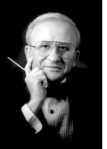The holidays and their music, Part I
By David Amos
 SAN DIEGO–We have just passed the time of the year when we are bombarded from everywhere by Christmas music. We hear it in television, radio, shopping malls, independent stores, school concerts, elevators, waiting rooms and anywhere else you can fathom. The exposure is inescapable.
SAN DIEGO–We have just passed the time of the year when we are bombarded from everywhere by Christmas music. We hear it in television, radio, shopping malls, independent stores, school concerts, elevators, waiting rooms and anywhere else you can fathom. The exposure is inescapable.
Yet, I enjoy listening to most of it. Every year, the month of December is a time to be in touch with once-a year friends, enjoy family gatherings, football playoffs and bowl games, and the exchanging of holiday greeting cards. Inevitably, we are exposed to so many Christmas carols, songs, Tchaikovsky’s Nutcracker Ballet, Handel’s Messiah, and other classical masterpieces associated with this time of the year.
Although in our home we do not celebrate Christmas in any way, I find all of the above not an annoyance, but a pleasant reminder of another secular year which has just passed. In my younger years, my mother of blessed memory used the word “Pesach”, or Passover, to indicate the time of the year to clean the house of unneeded objects and have everything neatly in its place. Pretty much what we call today Spring Housecleaning. In our household, we plan in the last two weeks in December to delete old files, re-organize, shred, and give away whatever has stopped serving our needs.
During my days as a music teacher, in the 1960’s and 70’s, I routinely prepared the high school singing groups, including the band and orchestra, for the expected Christmas Music concert, and I enjoyed it. It was similar to the task of preparing the marching band to perform at football game halftimes and parades. I made it my obligation to enjoy everything I was doing, and to transmit the enthusiasm and love for good music in whatever activity I was involved; that was the only way to create quality performances, when all participants were totally immersed in the music at hand. I admit to having a wonderful time with these activities.
Did I try to include Hannukah music in these programs? Yes and no. At times, I taught the non-Jewish high school students Hannukah favorites, sometimes in Hebrew, and a few other times my own arrangements. Other times, I did not bother to even try. After all, we have never tried to compare the two holidays, and to avoid, perish the thought, for Hannukah to be labeled “The Jewish Christmas”!
But, let’s face it: There are many great musical works, individual songs, and more serious compositions, oratorios, ballets, masses, cantatas, operas, and even pure orchestral ones which have been inspired by Christmas. They are part of the serious classical music repertoire, and, justifiably, likely to be with us forever.
But, I have often asked myself: Why are there so few works inspired by Judaism in the standard, mainstream classical music world? Sure, we have Ernest Bloch’s Sacred Service, and other serious, weighty compositions, but few can be safely labeled as “masterpieces”.
The answer is obvious, and documented by history. Up to the beginning of the Twentieth Century, being Jewish in the Christian and secular world was not a wise career move. Take the obvious cases of Mendelssohn and Mahler. Wagner did little to improve this with his virulent anti-Semitism, his 1850 book of Music and the Jews, the political, social, and economic dynamics of Europe, Russia, and the United States, even in its large, enlightened cities of progress and creativity, and the obvious tendency of the Jewish people to gravitate within their own communities, fearing and expecting rejection and retaliation from the outside world.
During these times, little if any music was being composed for the concert hall of any Jewish relevance, while masters such as Bach, Mozart, Haydn, Beethoven, Berlioz, Brahms, Verdi, Faure, and many others were feasting in major musical statements based on the New Testament. They left us timeless masterpieces to enjoy again and again.
When the Twentieth Century finally arrived, and Jewish creativity was finally allowed to flourish side by side, in equal terms with the secular world, classical music started to be rejected by the masses, because of the new musical styles, serialism, atonality, and modern idioms which did not consider beauty and accessibility a primary necessity.
All composers were caught in this wave of rejection of the modern styles, including the newly emancipated Jewish composers. With a few exceptions, (Gershwin, Copland, Bernstein, and others), Jewish composers were caught in the universal acceptance of pop culture and mass entertainment, while Jewish performers flourished worldwide.
I feel very strongly that serious Jewish music should be better represented in the concert hall, in recordings, and in the radio. In the last decade, I was approached by two radio networks in the United States that regularly program classical music. During the traditional Jewish holidays, including the High Holidays, these stations have wanted to include serious Jewish music representative of the particular festival, but had to go back to the old, redundant favorites, for lack of available variety. I was literally begged to encourage the creation of more Jewish music for broadcasting and recording.
What to do? Let’s talk about it in next week’s column of San Diego Jewish World.
*
Amos is conductor of the Tifereth Israel Community Orchestra and a guest conductor of professional orchestras around the world.
-
January 6, 2010 at 11:21 amThe holidays and their music, Part II « sdjewishworld